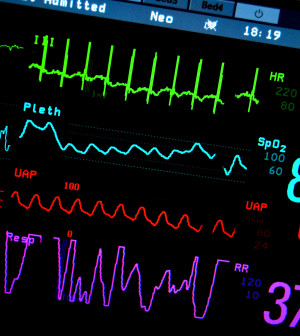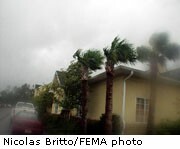- Double Mastectomy May Offer No Survival Benefit to Women With Breast Cancer
- Toxic Lead Found in Cinnamon Product, FDA Says
- Certain Abbott Blood Sugar Monitors May Give Incorrect Readings
- Athletes Can Expect High Ozone, Pollen Counts for Paris Olympics
- Fake Oxycontin Pills Widespread and Potentially Deadly: Report
- Shingles Vaccine Could Lower Dementia Risk
- Your Odds for Accidental Gun Death Rise Greatly in Certain States
- Kids From Poorer Families Less Likely to Survive Cancer
- Tough Workouts Won’t Trigger Cardiac Arrest in Folks With Long QT Syndrome
- At-Home Colon Cancer Test Can Save Lives
Post-Katrina Heart Woes Persisted at Least 6 Years


Six years after Hurricane Katrina wreaked havoc on the U.S. Gulf Cost, a New Orleans hospital was still seeing more than the usual number of heart attack patients.
The findings suggest that the stress caused by major disasters can linger long after more obvious signs of damage have healed or been cleared away, according to new research.
“Prior to Hurricane Katrina, about 0.7 percent of the patients we were treating in our medical center were suffering from [heart attacks],” said Dr. Matthew Peters, internal medicine resident at Tulane University School of Medicine and lead author of the study. “This increased to about 2 percent in the first three years after Katrina and continued to increase to almost 3 percent in years four through six after the storm.”
Overall, Tulane Medical Center had 1,177 heart attack cases in the six years after the 2005 storm. These patients represented 2.4 percent of all admissions.
The researchers suggest that chronic stress and higher unemployment could help explain the disturbing trend. An increase in risk factors for heart disease, such as smoking, drug or alcohol abuse, mental illness and not taking medication as prescribed, could play a role as well.
“We found more patients without insurance, who were unemployed and more who had a previous history of coronary artery disease, showing us that the milieu of patients was a sicker population,” noted senior author Dr. Anand Irimpen, an associate professor of medicine for the Tulane Heart and Vascular Institute, in the news release.
The study, published March 20 in Mayo Clinic Proceedings, also showed the timing of heart attacks changed after Katrina hit. Many more heart attacks occurred during the night or on the weekend, the researchers revealed. They noted that hospitals usually see fewer admissions for heart attacks at these times.
More information
The American Psychological Association provides more information on stress after a hurricane.
Source: HealthDay
Copyright © 2024 HealthDay. All rights reserved.










